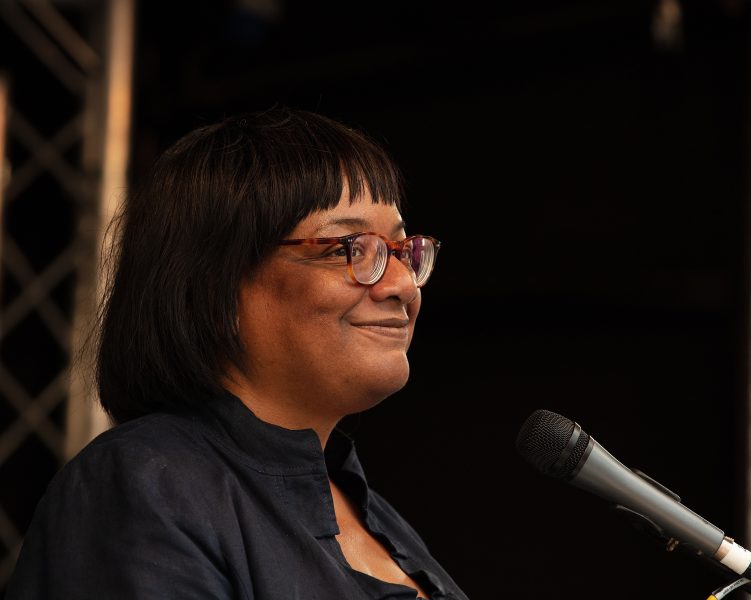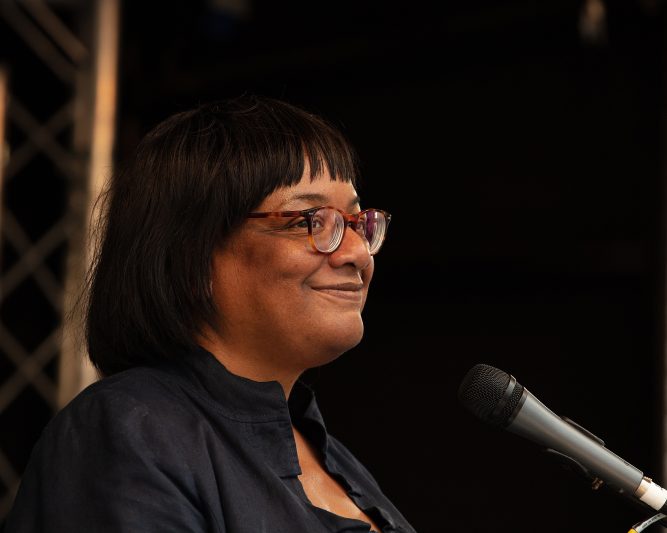By Angelo Boccato, freelance journalist
The British Parliament in the early 1980s did not count among its members any person of colour, despite the diversity in UK society. The mismatch between the makeup of the society and the political representation was not casual, but instead a direct reflection of the discrimination and racism experienced by Britons of African, Caribbean and Asian descent and their struggle to fight it.
The lack of representation in the UK Parliament started to change after the 1987 elections when Labour’s Bernie Grant, Paul Boateng, and Diane Abbott were elected to the House of Commons, paving the way for several other MPs of colour. Since then, Abbott has remained a left-leaning Labour MP and the most targeted British Black woman in politics.

The level of attacks Abbott receives is unparalleled among her peers, as Amnesty International highlighted in the run-up to the 2017 UK elections. The most recent alleged racist and misogynistic remarks by the biggest Tory donor, Frank Hester, alongside the political and media reactions, are emblematic of the state of racism denial in the country.
A shallow approach to diversity
Hester’s remarks about Abbott were both allegedly misogynistic and racist, also known as misogynoir . The donor said that looking at Diane Abbott makes you ‘want to hate all black women’. He also said the MP “should be shot”; this additional element is a signal of the escalation of the hateful level of the conversation, given the level of intimidation faced by MPs, and the fact that the Labour MP Jo Cox and Tory MP Sir David Amess were murdered, in 2016 and 2021, in the constituencies where they were elected.
Hester apologised for his words, adding though that gender and race were not involved in what he said. His remarks emerged after Tory MP Lee Anderson was accused of making Islamophobic remarks against London Mayor Sadiq Khan and fellow Tory MP Paul Scully’s claimed that there are no-go areas for non-Muslims in London and Birmingham.
From the Conservative side, there is often an attitude of brushing off conversations on racism within its ranks by simply pointing out the diversity within the cabinet. Transport secretary Mark Harper , for instance, referring to Hester’s remarks denied that the Tories have a problem with racism. He told BBC journalist Laura Kuessenberg “As the prime minister said this week, we are a party proudly led by the first British Asian prime minister. We are a party that welcomes people from across the UK whatever their background, whatever their race, if they share our values and approach to politics.”
This is however a form of “cosmetic”, instead of substantial diversity and representation; the fact that Rishi Sunak is the first British PM of South-Asian descent, and the cabinet features several non-white ministers does not mean that the government party does not have a problem with forms of racism and hate like Islamophobia, or that racism and hate are not present in the country.
Samuel Kasumu, a former adviser to prime minister Boris Johnson, warned the government not to use diversity as a “get-out-of-jail-free-card”.
This strategy is failing, as PM Sunak was the recipient of a letter with “signatories including equality campaigner Lord Simon Woolley, Operation Black Vote, the Runnymede Trust, the Black Equity Organisation, the Muslim Council Of Britain, and Black church groups imploring the prime minister to demonstrate a commitment to tackling racism” as Nadine White, The Independent’s Race Correspondent, reported.
This superficial response shows only how troubling a shallow and not nuanced approach to diversity can be; a perfect example of this can be seen in how hostile migration policies are voiced and acclaimed by politicians from a minority background; the fact that children of people who migrated to the UK support these policies should not make them more acceptable.
However, the opposition party also finds itself in a comprising situation. While Keir Starmer and the Labour leadership have criticised the Tories for Hester’s remarks, Abbott remains suspended from the party and was not even allowed to voice her views during a Prime Minister Question session, even though she was at the centre of the conversation.
Abbott was suspended last year following a letter published in the Observer. She wrote “Tomiwa Owolade claims that Irish, Jewish and Traveller people all suffer from “racism”. They undoubtedly experience prejudice. This is like racism and the two words are often used as if they are interchangeable.
“It is true that many types of white people with points of difference, such as redheads, can experience this prejudice. But they are not all their lives subject to racism.”
The remarks led to legitimate outrage from organisations like the Board of Deputies of British Jews and by Roma and Traveller civil society in Traveller Times (a publication aimed at challenging the one-sided representation of these communities in the British media). Abbott later apologised for her comments.
Marcus Ryder MBE, CEO of Film and TV Charity, chair of RADA, and host of the podcast Black British Lives Matter, commented Abbott’s letter in The Guardian and the way in which it led to public outrage, outlining what should be the approach. “We need to be precise in our language. We should not create false equivalence or hierarchies of victimhood (around racism) or we end up offending everyone.”
“Antisemitism is terrible and needs to be addressed. Islamophobia is terrible and needs to be addressed. Racism is terrible and needs to be addressed. But we cannot properly fight them if we think they are all the same,” continued Ryder, touching a central element of the conversation.
Keir Starmer instead labelled the letter as “antisemitic”, leading to Abbott’s suspension. However, the fact that other Labour MPs saw their whip restored following worst cases and racist comments, led to questions on certain selectiveness within the party to hit out at MPs of colour (and those who are left-wing), and not in line with the centrist leadership.
The media discourse selective condemnations
While hierarchies of racism are unhelpful and offensive and different forms of hate share the same vile nature, discussing and fighting them while knowing their differences should not be seen as a way to diminish any of them.
However, as a vast section of the media did not grasp that. In the UK political, social, and media discourse selective condemnations of racist and discriminatory rhetoric are a common practice.
This can be seen by how comments in Tory-leaning media like The Telegraph looked at Hester’s comments. They focusing on the fact that Abbott should not return to the Labour benches, as “You do not solve one racial offence by turning a blind eye to the other”.
In the Spectator, observations were raised on how Tory MP Michael Gove found himself in a “muddle over Tory donor” (as Hester would fall into the new categories of extremism that the government and Gove himself want to introduce), the fact that Abbott was not heard in the Commons after trying to speak 46 times, and that the following column by Diane Abbott in the Guardian, where she voiced her views “suggest an olive branch (from the party leadership should be extended)”.
Media coverage of racism in Britain
Lecturers Sofia Collignon and Orly Siow pointed out in The Conversation UK, regarding Hester’s remarks that “this is more than a story about a single individual”. “Racial and gendered inequalities are still rife in British politics, and they hit Black and ethnic minorities the hardest. What would it take to eliminate these dynamics from political parties, parliament, and the press?”
The findings of the Forde report last year, mentioned by Abbott in her Guardian column, pointed out how racism and Islamophobia are not taken seriously in the Labour Party, a reminder of how troubling it is to analyse racism in a factional party framework.
These points were echoed by Baroness Lawrence, Labour race adviser and mother of Stephen Lawrence (a 18-year-old Black student murdered in a racist attack in 1993) who accused Keir Starner of “failing to listen and claimed that “gatekeepers” around the Labour leader obstruct her work”.
The impression that can be left on observers is that, in these instances, like in many others, a section of the media seems to be focusing on the specific case, outside of the framework of racial inequalities in Britain, while also being deluded about what diversity and inclusion mean, beyond pure virtue signalling.
Novara Media contributing editor Moya Lothian-Mclean wrote in VOGUE on 15 March “Right now, British parliamentary politics is in the grip of a moral panic about extremism and “safety”, prompted mostly by the popular pro-Palestine movement.
“But none of this parliamentary rhetoric about extremism and MP safety has been mobilised to protect Diane Abbott after the Conservative’s biggest donor said he wanted to shoot her. Quite the opposite; the system has moved to shield Frank Hester, a poor man who made a little mistake and needs to be given grace and compassion.
“Perhaps the new takeaway I would add is this: there is a lot of debate about hierarchies of racism currently. But to my mind, we need to factor in the political allegiance of racism.”
Sociology professor at the University of Manchester, and columnist Gary Younge pointed out in the Guardian that “ (Rishi Sunak) may lead one of the most diverse cabinets in history, but that does not alter the fact that this version of diversity is being bankrolled by a man whose best defence is that “he doesn’t hate Black women at all”.
On the other hand, Younge highlighted in his column, how the protracted suspension of Abbott shows a certain opportunism by Labour. “So when Labour lambasts Sunak for his unprincipled and unconvincing response to Hester’s comments, it does not do so in defence of Abbott: those now in charge of the party have been complicit in insulting her for years.
“Labour pursues it because it can score clear political points against its adversaries. That is the definition of instrumentalisation. It is not only cynical, but also dangerous. Racism is not a game. It is a serious issue that affects the lives of millions of people.”
Hierarchies of racism and factional anti-racism are ill-informed, offensive, and cynical, taking away the overall picture and struggle and the context of racial discrimination that the media should tackle and not fuel.
The fact that the murder by the police of Chris Kaba, a Black 24-year-old, on 5 September 2022 and the struggle to find justice, has been treated, at best as an afterthought in the British media cycle is proof of how Britain’s leading opinion-makers overlook racial injustice in the country.
In this, actual diversity and representation have a key role; in the UK, only 7% of top editors are people of colour, something that, in addition to the overall lack of diversity in the newsrooms, explains the reasons why the coverage of conversations about race, class, diversity, and representation is partial and not comprehensive at best, and hateful and discriminatory at worst.
Diane Abbott picture – shutterstock.com
Disclaimer:
The views and opinions expressed in this article are solely those of the author and do not reflect the official policy or position of the Media Diversity Institute.Any question or comment should be addressed to editor@media-diversity.org

